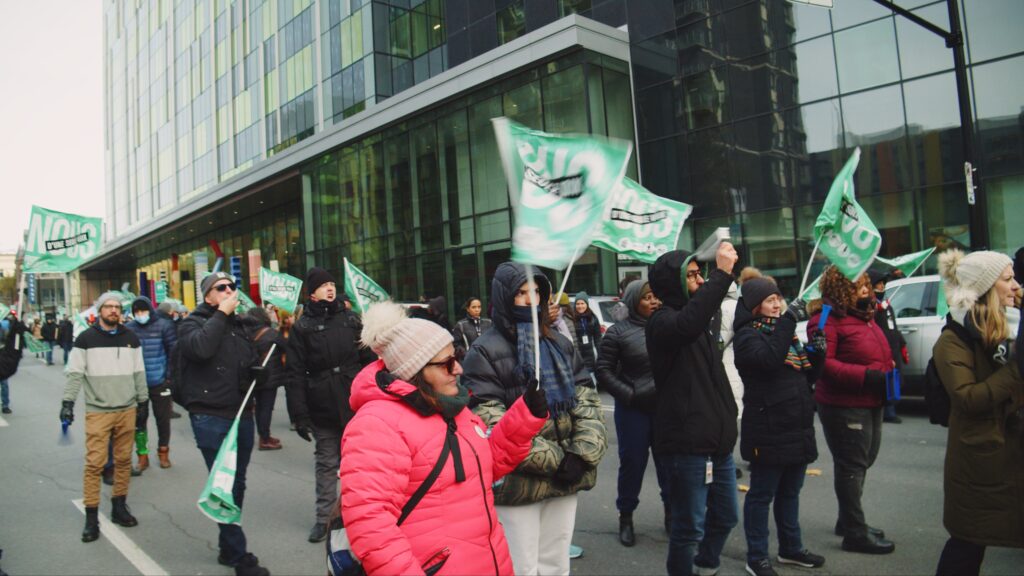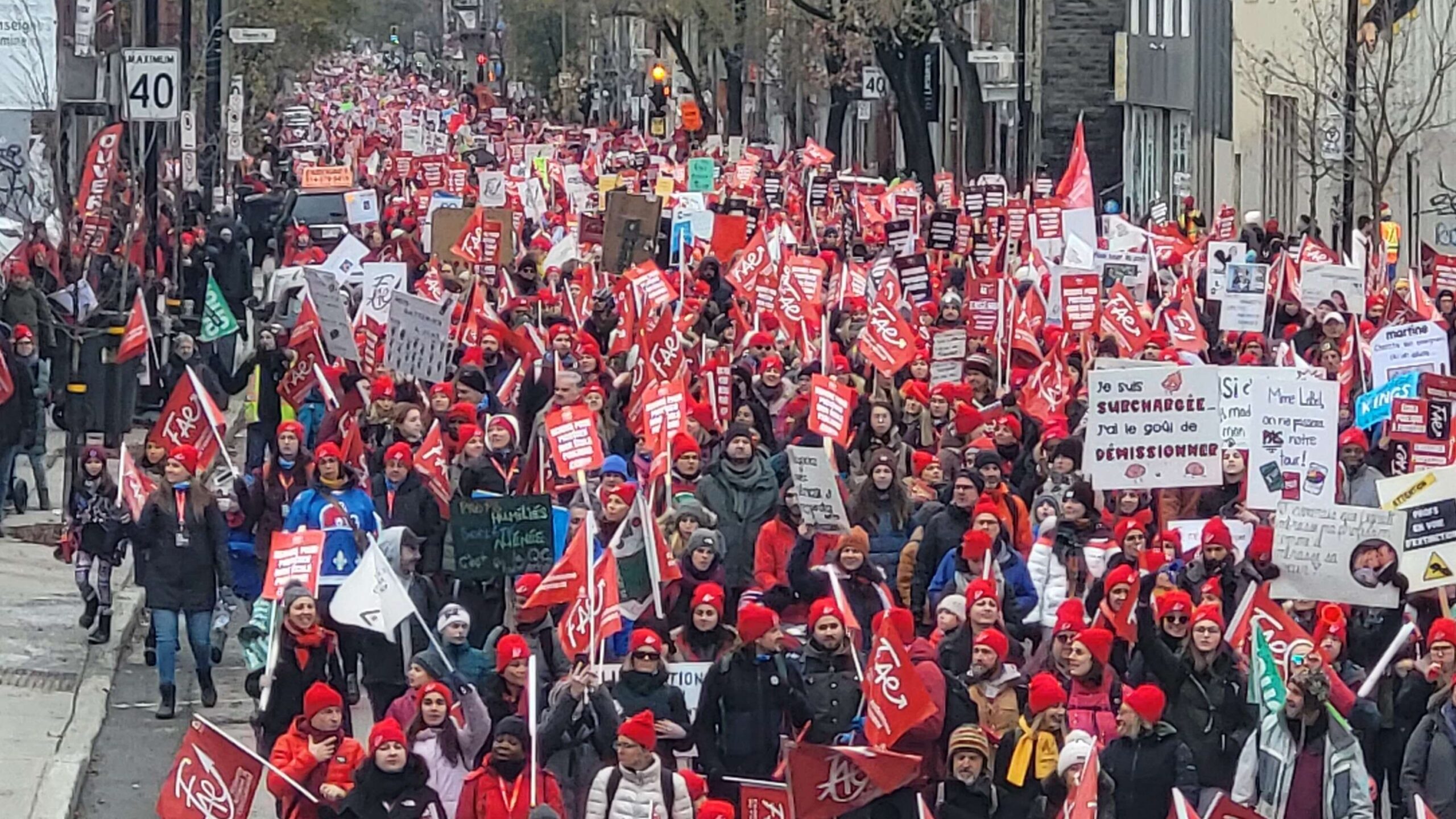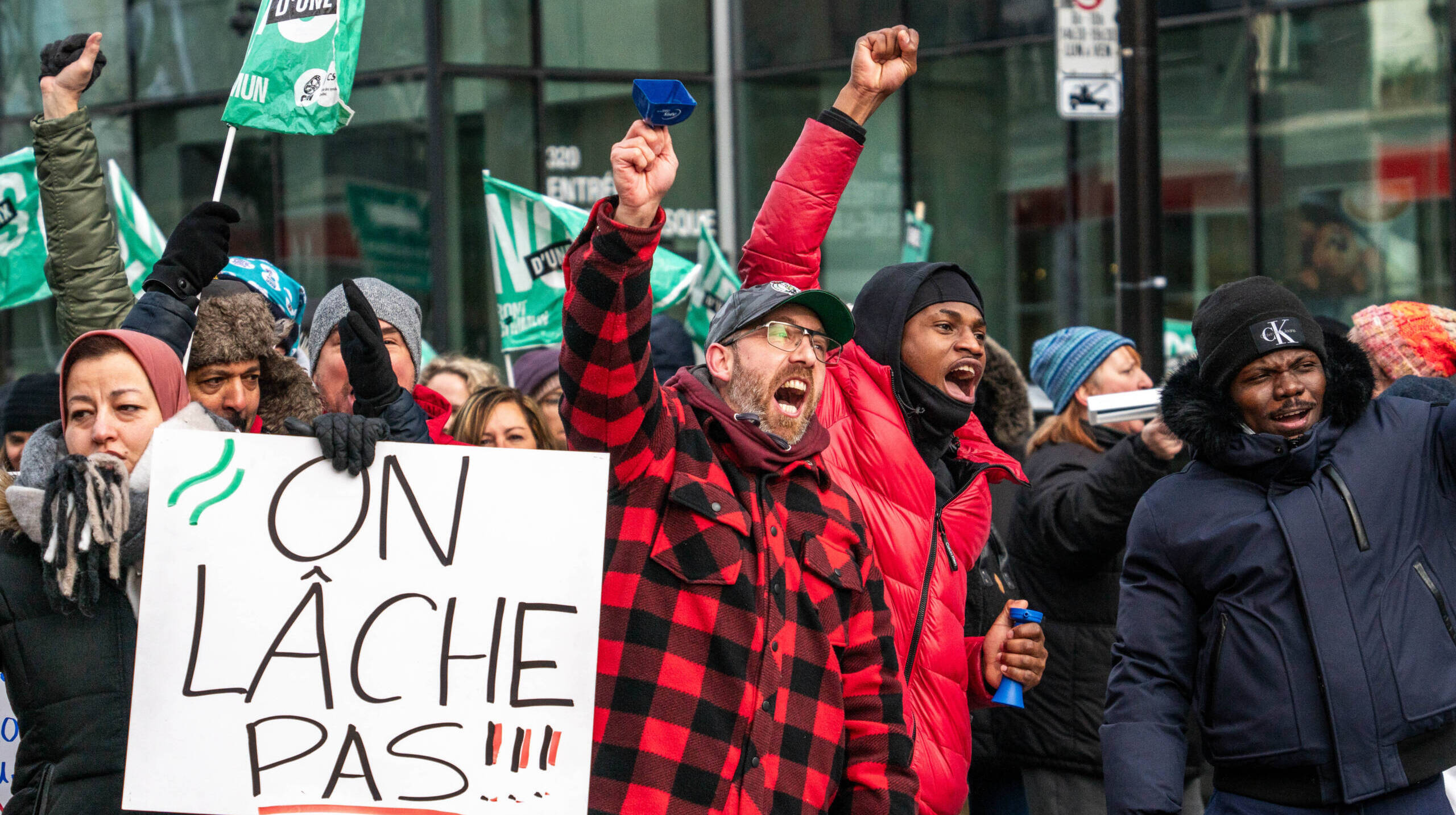November 23, 2023 will go down in the history of Quebec and Canada, with 566,000 workers walking off the job. This marks the biggest strike since the AT&T strike in North America in 1983, which mobilized 675,000 telephone workers.
Members of the United Front of Unions, representing 420,000 workers, voted 95% in favor of an unlimited general strike, not yet launched but still in sight. They are joined by the Fédération Autonome de l'Enseignement (FAE), with 66,000 members, and the Quebec Interprofessional Health Federation (FIQ), representing over 80,000 healthcare workers.
The strikers are demanding a major wage increase to offset the tough rise in the cost of living, indexation of their wages to inflation to avoid the same situation happening again, an immediate increase of $100 a week for all workers, as well as better working conditions and practices to strengthen public services and attract new workers.
"It's historic, we've never seen anything like it," says Réjean Leclerc, President of the Fédération de la Santé et des Services Sociaux—CSN (FSSS-CSN), in an interview with North Star. In his view, what's happening is a result of suffocating inflation, as well as reforms that take power away from workers in the organization of their workplaces. It's also a question of "deteriorating services."

He adds that "the more things go, the less needs are met, as governments decide to underfund services. That's the real problem." If the new work contract doesn't "ensure good working conditions to bring staff back into the public service, to provide care to the population, to provide social services, well then, we're going to find ourselves facing a society that's falling apart, and it's going to get worse and worse!"
This major mobilization affects all sectors, with demonstrations in front of the Quebec National Assembly and in Montreal. The Fédération interprofessionnelle de la santé du Québec (FIQ), which represents over 80,000 healthcare professionals, has also joined the movement, stating that "the time for vocation is over".
Teachers affiliated to the FAE have already embarked on an unlimited general strike, and the United Front may well follow if negotiations fail to break the deadlock. FAE President Mélanie Hubert says teachers are prepared to stay on strike for as long as it takes to reach a satisfactory agreement.

"I live in Montreal, I was born in Montreal, I grew up in Montreal, and with my teacher's salary, I'm not able to buy a house in Montreal," exclaimed Louis-Philippe, a teacher for 14 years. "How come? The children of Montreal are going to have teachers who live where? Something's not right here. If they want us to work in Montreal, we have to be able to live in Montreal!"
The Coalition Avenir Québec (CAQ) government, led by François Legault, finds itself at the heart of the storm. It is accused by public sector workers of ignoring their situation, in addition to treating its "guardian angels" in a derogatory and deplorable manner. "Guardian angels" was the expression used by the CAQ during the COVID-19 crisis to refer to healthcare workers, who were holding the system together under excruciating conditions.
Quebec's Health Minister, Christian Dubé, recently suggested that the government should be able to negotiate working conditions-including schedules-with workers directly, without going through their unions, arguing that this would bring greater flexibility to the healthcare network, by making existing workers work harder.
Hardly surprising: this is an argument regularly used by the heads of large corporations or governments to try and diminish the strength of the unions, the very ones they are worried about today, and which could well bring them to heel. United Front workers argue that the problem isn't the hours, but that workers are leaving because they're already exhausted.
Faced with the pressure, Prime Minister Legault said he was prepared to slightly improve the government's offer, but only if the unions agreed to his demands for flexible working hours. He still refuses to index wages to inflation. In a press release dated October 23, the United Front of unions declared that "to demand more flexibility at every turn is an aberration. If the government wants to be an employer of choice, it has to translate into action at the bargaining table."
Serge, a retired teacher from Laval, wanted to do a "little retrospective" on the kind of reforms that, over time, should have saved public service. "The Parti Québécois cut teachers' salaries by 25% by passing a special law forcing them back to work. Then there was the Liberal party, which cut billions from education for years, and now there's the CAQ, which is turning a deaf ear. When they came to power, they said they'd improve things, but things just keep getting worse."

I'm trying to understand why, despite all the rhetoric about the importance of education, teachers aren't paid more.
François Legault
Carl-Édouard, a math teacher for 23 years, told North Star that "we're fighting for your children, not just for the money. We always say that our work is a vocation, but we never stop saying it: we're tired. Improve our working conditions so we can give more."
For Louis-Philippe, the government is not responding firmly because it wants to "test public opinion" to find out how much compromise workers are prepared to make "and how far we'll go. If public opinion is no longer with us, I imagine they'll come up with something like special legislation, like they tried to do in Ontario not so long ago."
"Ford brought out his special law and it didn't work, so he had to go back. Maybe it'll be the same old nonsense, because this government doesn't seem to be learning from its mistakes."

I'd like Legault to embrace my profession the way he embraces his sister.
A protester's sign in Quebec City
- Us Against the State: A Documentary on the United Front
- Quebec healthcare workers still without a contract
- Quebec unionized nurses reject “disrespectful” proposed deal
- “We could have fought together for better,” says FIQ member
- One in ten workers soon on strike?
- 1972, the Year Workers Shook the State
- Privatization in the name of “efficiency”
- Strike mandates accumulate with overwhelming support
- An Education Reform Deaf to the Key Issues
- A historic movement, “we’ve never seen anything like it”
- Québec government improvises solutions
- 100,000 workers in the street: “they’ve had enough”
- It’s Halloween for Quebec’s Public Employees, Or at Least for Some
- United Front workers determined to keep up the fight
- FAE to call unlimited strike on November 23
- The CAQ cares about kids (or so it says)
- Government treatment fuels “our indignation and will strengthen our mobilization”
- Superior Court Violates Teachers’ Right to Strike
- “Legault and all the others are destroying Quebec as we know it”


